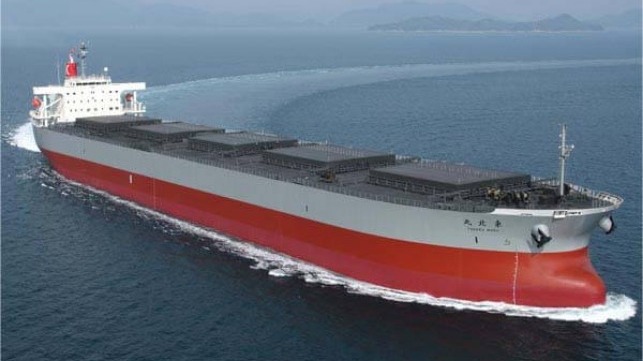“K” Line Prepares for New EEDI with Methanol-Ready Bulker Order

After a decade of building a successful class of bulkers specifically designed for the coal transport sector, Japan’s Kawasaki Kisen Kaisha (“K” LINE) is launching a new class of vessels designed to meet the emerging efficiency regulations. The shipping company has ordered three next-generation bulkers that incorporate new designs developed by the Nihon Shipyard and will be delivered methanol-ready in anticipation that the low-emission fuel will be adopted.
The shipping company developed a successful sub-category known as the Corona series specifically designed for the needs of the coal transport sector. The Corona series of thermal coal carriers was developed by “K” Line with the first vessels being built in the early 2000s. “K” Lines has 26 dedicated thermal coal carriers in its fleet having taken delivery of new Corona series vessels between 2008 and 2018. The high-profile design features a wider hull and requires a shallower draft in consideration of berth conditions at power plants. The Corona series was gradually developing into a standard for the thermal coal shipping business in Japan. The original ships were 88,000 dwt with a length of 755 feet (230 meters) and a 125-foot (38-meter) beam.
“K: Line highlights that Phase 3 of EEDI requires bunkers for which construction contracts will be concluded in 2025 or thereafter, to be 30 percent more efficient in CO2 emissions compared to the current EEDI standards. Working with Nihon, they have contracted for a newly developed and designed 92-type (92,000 dwt) version of the Corona series to meet the requirements while incorporating the standards of the earlier class for thermal coal transportation.
The new vessels will feature a 7-hatch design while using the same basic dimensions as the earlier vessels of the series. By including a newer main engine and adoption of energy-saving accessories, “K” Line reports the new class will exceed the EEDI requirements expected to achieve a 40 percent reduction in CO2 emissions.

that matters most
Get the latest maritime news delivered to your inbox daily.
They are also at the forefront of adopting methanol as the anticipated future fuel for the vessels. While DNV calculates with its Alternative Fuel Insights database that there are now 205 methanol-fueled vessels on order and due for delivery by 2028, only 13 are bulkers.
“K” LINE highlights the ships are part of its corporate Environmental Vision 2050, a long-term environmental approach in which the company has set a goal of improving CO2 emissions efficiency by 50 percent and achieving net-zero GHG emissions by 2050. To achieve its targets, the line plans to implement a shift such as new highly eco-friendly fuels, including the implementation of wind power propulsion systems.
